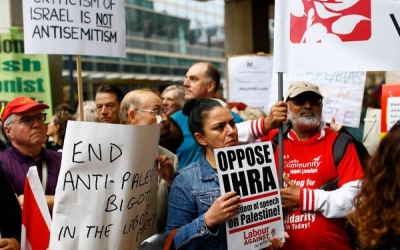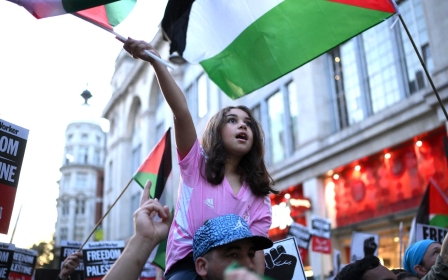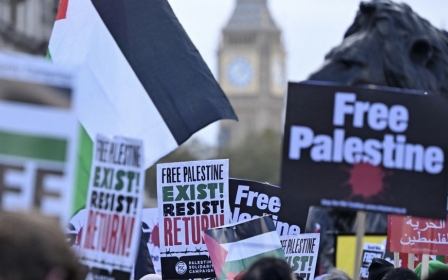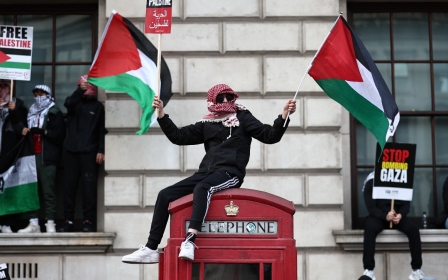Israel-Palestine war: Social media surveillance creates a 'culture of fear' on UK campuses
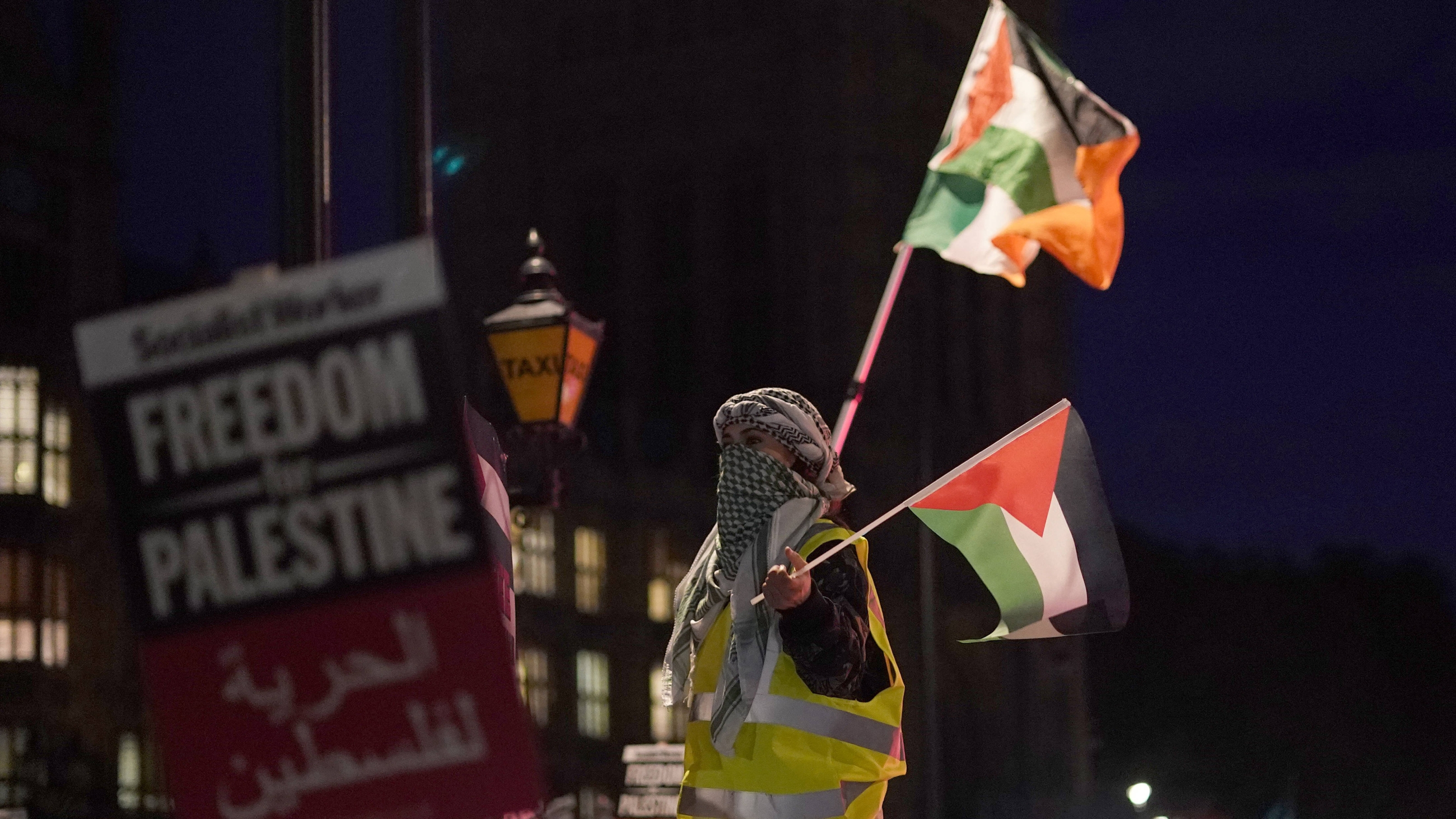
Academics have reported a "culture of fear" on UK campuses, as social media surveillance, which disproportionately targets racialised academic staff and students supporting Palestine, has resulted in reports to the police, the Prevent counter-terrorism strategy and university disciplinary committees.
"Immediately after October 7, we saw a kind of surveillance taking place on social media, particularly against any pro-Palestinian voices, but particularly against Palestinians and other people of colour," Neve Gordon, the chair of the British Society for Middle Eastern Studies (BRISMES)'s committee on academic freedom, and professor of human rights at Queen Mary University told Middle East Eye.
The weaponisation of social media to monitor academics and students has also proliferated in Israeli academia, where dozens of students were suspended for "supporting terrorism" or "incitement to terrorism" based on their social media activity.
BRISMES told MEE that it had received multiple reports of complaints being filed against academics with universities, the police and Prevent, often based on social media posts in support of Palestine.
In some cases, this has resulted in the staff members being investigated or even suspended.
New MEE newsletter: Jerusalem Dispatch
Sign up to get the latest insights and analysis on Israel-Palestine, alongside Turkey Unpacked and other MEE newsletters
The European Legal Support Centre (ELSC), an independent organisation defending and empowering the Palestine solidarity movement in Europe through legal means, has documented 87 "incidents of repression" against Palestinian advocacy in the UK since the ongoing Israeli assault on Gaza began on 7 October. This includes 24 cases in academia.
According to the ELSC, racialised women are over-represented among the individuals in these 24 cases.
"[The repression] can take some very serious forms, [including] police violence and threats of legal action," Alice Garcia, the advocacy and communication manager at the ELSC, told MEE.
"We also [heard from] one academic who received death threats from an online publication," Garcia said.
In limbo
MEE spoke to an academic at a London university who had complaints filed against them with their employer, Prevent and the police after they retweeted a Palestine Solidarity Campaign (PSC) call-out for a protest.
They were forced to deactivate their X account due to a "pile on" of abusive messages.
"People were commenting, 'deport her'. I’ve never experienced anything like this…this is just another level," they told MEE on condition of anonymity.
"The university has been relatively good. I think [it] is a more confident university [with] a big law department. They’ve held the line… but the pressures from outside the university are immense.
"I hope they can hold the line."
Follow Middle East Eye's live coverage of the Israel-Palestine war
MEE spoke to another academic who was told that a complaint was made about them for reposting a statement from Birzeit University's staff union in occupied Palestine several days after the surprise Hamas attack on southern Israel on 7 October.
"I was informed that a complaint had been brought against me that I had tweeted something…that the complainants felt constituted the dissemination of antisemitic tropes and a glorification or celebration of Hamas," they told MEE, "but there was no mention of Hamas in the statement."
Shortly after their name appeared in an article criticising academics who had commented on the unfolding situation in Israel and Gaza on their social media accounts, they were informed that they would be investigated and that they would hear from the university imminently.
"It’s been three weeks and I still have not heard anything," they said. "I'm in limbo."
MEE is also aware of two cases of universities reporting students to the police.
In one case, a female student was reported for a social media post which they had not posted. She was held for 15 hours in a police cell under suicide watch.
The student told MEE that she was attended by a male police officer throughout their detention; an experience she found invasive and traumatising. The student reported that she is suffering from severe anxiety and depression as a result.
ELSC has recorded 17 arrests related to Palestinian advocacy since 7 October.
"This is a new kind of state repression that we haven't observed that much in the past," Garcia told MEE.
A culture of fear
The weaponisation of social media to monitor academics and students' expressions of Palestinian advocacy is nothing new.
A 2022 ELSC and BRISMES report documented 40 cases, recorded between 2017 and 2022, in which UK university staff and students were accused of antisemitism based on the controversial International Holocaust Remembrance Alliance's (IHRA) definition of antisemitism.
The report found a "significant and sustained levels of monitoring and surveillance by complainants including recording student speeches and staff lectures; monitoring student or staff social media posts."
The result is a "chilling effect" on UK campuses, with individuals deterred from speaking about Palestine.
Last month, BRISMES called on UK universities to drop IHRA's controversial definition of antisemitism due to concerns it had been used to target students and staff critical of Israel.
The Prevent counter-terrorism strategy has also been instrumental in policing Palestinian advocacy on campuses. In 2017, MEE revealed that university staff were being advised to "risk-assess and manage" Palestinian activism as part of Prevent training.
'This extends beyond Palestine; migrant staff and students believe that immigration policies are weaponised against them'
- Sanaz Raji, Unis Resist Border Controls
Hostile environment policies have also long deterred migrant staff and students from engaging in pro-Palestine activism.
"There has been a lot of discussion about academic freedom of speech, but there is less of an understanding of how 11 years of hostile environment policy… has created a culture of fear for migrant university staff and students in participating in activism," Sanaz Raji, a campaigner from Unis Resist Border Controls (URBC), a migrant-led campaign opposed to border controls on UK campuses, told MEE.
"This extends beyond Palestine," Raji said. "Migrant staff and students believe that immigration policies are weaponised against them.
"This in turn limits their ability to exercise their political voice on and off campus because of a justifiable fear that whatever they either say or write could affect their precarious immigration status and would lead to them being removed from the UK."
On 13 October, the Daily Mail reported that the UK immigration minister, Robert Jenrick, said that foreigners in the UK who display antisemitic behaviour or praise Hamas could face deportation.
"The Conservatives are using Hamas to conflate activism for Palestinian liberation with terrorism, which is inherently wrong and dangerous. Migrant staff and students that I talk to are concerned about this," Raji said.
A mass mobilisation
"There has been a mass mobilisation against this kind of silencing," Gordon said. "And my sense is that the pushback is beginning to work…because what we’re seeing recently is that, although the complaints keep coming, the universities don't automatically begin an investigation."
In October, the UK’s independent research funding body (UKRI) suspended its Equality, Diversity and Inclusion Advisory Group following an open letter by Michelle Donelan, the secretary of state for science and technology, demanding that UKRI cut its links with two academics from the panel that Donelan accused of promoting "extremist views" on the war in Gaza.
In response, 20 academics announced their resignations from the panel, while thousands more signed an open letter denouncing the decision.
On Friday, students at 28 universities across the UK staged a mass walkout to demand a ceasefire in Gaza.
In a joint statement, 30 Palestine societies from universities across the country said that "the hostile environment that is being encouraged by university administrators has effectively banned Palestinians from their right to publicly grieve the catastrophe befalling their people in Gaza."
Middle East Eye delivers independent and unrivalled coverage and analysis of the Middle East, North Africa and beyond. To learn more about republishing this content and the associated fees, please fill out this form. More about MEE can be found here.


